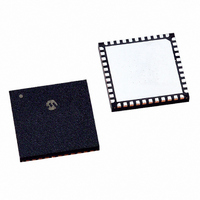PIC24FJ64GA004-E/ML Microchip Technology, PIC24FJ64GA004-E/ML Datasheet - Page 102

PIC24FJ64GA004-E/ML
Manufacturer Part Number
PIC24FJ64GA004-E/ML
Description
16-bit Family, 16 MIPS, 64KB Flash, 8192 Bytes RAM, 35 I/O, NanoWatt 44 QFN 8x8x
Manufacturer
Microchip Technology
Series
PIC® 24Fr
Datasheets
1.PIC24FJ16GA002-ISS.pdf
(52 pages)
2.PIC24FJ16GA002-ISS.pdf
(268 pages)
3.PIC24FJ16GA002-ISS.pdf
(22 pages)
Specifications of PIC24FJ64GA004-E/ML
Core Processor
PIC
Core Size
16-Bit
Speed
32MHz
Connectivity
I²C, PMP, SPI, UART/USART
Peripherals
Brown-out Detect/Reset, LVD, POR, PWM, WDT
Number Of I /o
35
Program Memory Size
64KB (22K x 24)
Program Memory Type
FLASH
Ram Size
8K x 8
Voltage - Supply (vcc/vdd)
2 V ~ 3.6 V
Data Converters
A/D 13x10b
Oscillator Type
Internal
Operating Temperature
-40°C ~ 125°C
Package / Case
44-QFN
Processor Series
PIC24FJ
Core
PIC
Data Bus Width
16 bit
Data Ram Size
8 KB
Interface Type
I2C, IrDA, SPI, UART
Maximum Clock Frequency
32 MHz
Number Of Programmable I/os
35
Number Of Timers
5
Maximum Operating Temperature
+ 125 C
Mounting Style
SMD/SMT
3rd Party Development Tools
52713-733, 52714-737, 53276-922, EWDSPIC
Development Tools By Supplier
PG164130, DV164035, DV244005, DV164005, PG164120, DM240011, DM300027, DV164033, MA240013, AC164127, DM240002
Minimum Operating Temperature
- 40 C
On-chip Adc
10 bit, 13 Channel
Lead Free Status / RoHS Status
Lead free / RoHS Compliant
For Use With
876-1004 - PIC24 BREAKOUT BOARDDM240011 - KIT STARTER MPLAB FOR PIC24F MCUAC162088 - HEADER MPLAB ICD2 24FJ64GA004 28AC164336 - MODULE SOCKET FOR PM3 28/44QFNDV164033 - KIT START EXPLORER 16 MPLAB ICD2
Eeprom Size
-
Lead Free Status / Rohs Status
Details
- PIC24FJ16GA002-ISS PDF datasheet
- PIC24FJ16GA002-ISS PDF datasheet #2
- PIC24FJ16GA002-ISS PDF datasheet #3
- Current page: 102 of 268
- Download datasheet (2Mb)
PIC24FJ64GA004 FAMILY
8.4.3
The Secondary Oscillator (SOSC) can operate in two
distinct levels of power consumption based on device
configuration. In Low-Power mode, the oscillator
operates in a low-gain, low-power state. By default, the
oscillator uses a higher gain setting, and therefore,
requires more power. The Secondary Oscillator Mode
Selection
determine the oscillator’s power mode.
When Low-Power mode is used, care must be taken in
the design and layout of the SOSC circuit to ensure that
the oscillator will start up and oscillate properly. The
lower gain of this mode makes the SOSC more
sensitive to noise and requires a longer start-up time.
DS39881D-page 102
Note:
SECONDARY OSCILLATOR
LOW-POWER OPERATION
This feature is implemented only on
PIC24FJ64GA004 family devices with a
major silicon revision level of B or later
(DEVREV register value is 3042h or
greater).
bits,
SOSCSEL<1:0>
(CW2<12:11>),
8.4.4
On low pin count devices, such as those in the
PIC24FJ64GA004 family, due to pinout limitations, the
SOSC is more susceptible to noise than other PIC24F
devices. Unless proper care is taken in the design and
layout of the SOSC circuit, it is possible for
inaccuracies to be introduced into the oscillator's
period.
In general, the crystal circuit connections should be as
short as possible. It is also good practice to surround
the crystal circuit with a ground loop or ground plane.
For more detailed information on crystal circuit design,
please refer to the “PIC24F Family Reference Manual”,
Section 6. “Oscillator” (DS39700) and Microchip
Application Notes: AN826, “Crystal Oscillator Basics
and Crystal Selection for rfPIC
Devices” (DS00826) and AN849, “Basic PICmicro
Oscillator Design” (DS00849).
OSCILLATOR LAYOUT
2010 Microchip Technology Inc.
®
and PICmicro
®
®
Related parts for PIC24FJ64GA004-E/ML
Image
Part Number
Description
Manufacturer
Datasheet
Request
R

Part Number:
Description:
Manufacturer:
Microchip Technology Inc.
Datasheet:

Part Number:
Description:
Manufacturer:
Microchip Technology Inc.
Datasheet:

Part Number:
Description:
Manufacturer:
Microchip Technology Inc.
Datasheet:

Part Number:
Description:
Manufacturer:
Microchip Technology Inc.
Datasheet:

Part Number:
Description:
Manufacturer:
Microchip Technology Inc.
Datasheet:

Part Number:
Description:
Manufacturer:
Microchip Technology Inc.
Datasheet:

Part Number:
Description:
Manufacturer:
Microchip Technology Inc.
Datasheet:

Part Number:
Description:
Manufacturer:
Microchip Technology Inc.
Datasheet:










